Beaeve54
On this page, you find all documents, package deals, and flashcards offered by seller beaeve54.
- 1219
- 0
- 19
Community
- Followers
- Following
1 Reviews received
1238 items
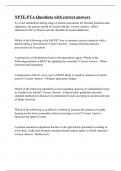
NPTE-PTA Questions with correct answers
To avoid substitution during range of motion assessment for forearm pronation and supination, the patient should be seated with the: Correct Answer - elbow stabilized at 90° of flexion, and the shoulder in neutral adduction. Which of the following is the SAFEST way to measure exercise intensity with a patient taking a beta-blocker? Correct Answer - Asking about the patient's perceived level of exertion A patient has a full-thickness burn to the antecubital region. Which of the following ...
- Exam (elaborations)
- • 8 pages •
To avoid substitution during range of motion assessment for forearm pronation and supination, the patient should be seated with the: Correct Answer - elbow stabilized at 90° of flexion, and the shoulder in neutral adduction. Which of the following is the SAFEST way to measure exercise intensity with a patient taking a beta-blocker? Correct Answer - Asking about the patient's perceived level of exertion A patient has a full-thickness burn to the antecubital region. Which of the following ...
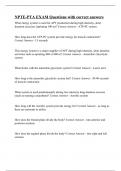
NPTE-PTA EXAM Questions with correct answers
What energy system is used for APT production during high intensity, short duration exercises (sprinting 100 m)? Correct Answer - ATP-PC system How long does the ATP-PC system provide energy for muscle contraction? Correct Answer - 15 seconds This energy system is a major supplier of APT during high intensity, short duration activities such as sprinting 400 or 800 m? Correct Answer - Anaerobic Glycolytic system What forms with the anaerobic glycolytic system? Correct Answer - Lactic aci...
- Exam (elaborations)
- • 26 pages •
What energy system is used for APT production during high intensity, short duration exercises (sprinting 100 m)? Correct Answer - ATP-PC system How long does the ATP-PC system provide energy for muscle contraction? Correct Answer - 15 seconds This energy system is a major supplier of APT during high intensity, short duration activities such as sprinting 400 or 800 m? Correct Answer - Anaerobic Glycolytic system What forms with the anaerobic glycolytic system? Correct Answer - Lactic aci...
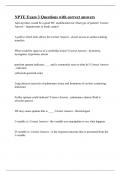
NPTE Exam 3 Questions with correct answers
Anti-tip tubes would be a good WC modification for what type of patient? Correct Answer - Impairments in trunk control A pull to wheel lock allows for Correct Answer - closer access to surfaces during transfers What would be signs/sx of a cerebellar lesion? Correct Answer - dysmetria, nystagmus, hypotonia, ataxia purulent sputum indicates: ___ and is commonly seen in what dx? Correct Answer - infection yellowish-greenish color Lung abscess (necrosis of pulmonary tissue and formation...
- Exam (elaborations)
- • 24 pages •
Anti-tip tubes would be a good WC modification for what type of patient? Correct Answer - Impairments in trunk control A pull to wheel lock allows for Correct Answer - closer access to surfaces during transfers What would be signs/sx of a cerebellar lesion? Correct Answer - dysmetria, nystagmus, hypotonia, ataxia purulent sputum indicates: ___ and is commonly seen in what dx? Correct Answer - infection yellowish-greenish color Lung abscess (necrosis of pulmonary tissue and formation...
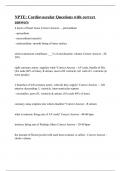
NPTE: Cardiovascular Questions with correct answers
4 layers of heart tissue Correct Answer - - pericardium - epicardium - myocardium (muscle) - endocardium: smooth lining of inner surface atrial contraction contributes ___% of end diastolic volume Correct Answer - 20-30% right coronary artery: supplies what? Correct Answer - AV node, bundle of His, (SA node 60% of time), R atrium, most of R ventricle, inf. wall of L ventricle (in most people) 2 branches of left coronary artery, what do they supply? Correct Answer - - left anterior de...
- Exam (elaborations)
- • 14 pages •
4 layers of heart tissue Correct Answer - - pericardium - epicardium - myocardium (muscle) - endocardium: smooth lining of inner surface atrial contraction contributes ___% of end diastolic volume Correct Answer - 20-30% right coronary artery: supplies what? Correct Answer - AV node, bundle of His, (SA node 60% of time), R atrium, most of R ventricle, inf. wall of L ventricle (in most people) 2 branches of left coronary artery, what do they supply? Correct Answer - - left anterior de...
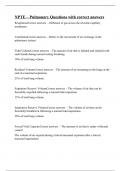
NPTE – Pulmonary Questions with correct answers
RespirationCorrect answers - Diffusion of gas across the alveolar-capillary membrane. VentilationCorrect answers - Refers to the movement of air exchange in the pulmonary system. Tidal VolumeCorrect answers - The amount of air that is inhaled and exhaled with each breath during normal resting breathing. 10% of total lung volume Residual VolumeCorrect answers - The amount of air remaining in the lungs at the end of a maximal expiration. 25% of total lung volume. Expiratory Rese...
- Exam (elaborations)
- • 31 pages •
RespirationCorrect answers - Diffusion of gas across the alveolar-capillary membrane. VentilationCorrect answers - Refers to the movement of air exchange in the pulmonary system. Tidal VolumeCorrect answers - The amount of air that is inhaled and exhaled with each breath during normal resting breathing. 10% of total lung volume Residual VolumeCorrect answers - The amount of air remaining in the lungs at the end of a maximal expiration. 25% of total lung volume. Expiratory Rese...
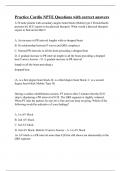
Practice Cardio NPTE Questions with correct answers
A 50 male patient with secondary-degree heart block (Mobitz type I Wenckebach) presents his ECG report to the physical therapist. What would a physical therapist expect to find on his EKG? A. An increase in PR interval lengths with no dropped beats B. No relationship between P waves and QRS complexes C. Normal PR intervals in all the beats preceding a dropped beat D. A gradual increase in PR interval length in all the beats preceding a dropped beat Correct Answer - D. A gradual increase in...
- Exam (elaborations)
- • 17 pages •
A 50 male patient with secondary-degree heart block (Mobitz type I Wenckebach) presents his ECG report to the physical therapist. What would a physical therapist expect to find on his EKG? A. An increase in PR interval lengths with no dropped beats B. No relationship between P waves and QRS complexes C. Normal PR intervals in all the beats preceding a dropped beat D. A gradual increase in PR interval length in all the beats preceding a dropped beat Correct Answer - D. A gradual increase in...
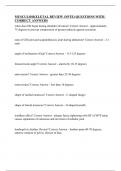
MUSCULOSKELETAL REVIEW (NPTE) QUESTIONS WITH CORRECT ANSWERS
when does ER begin during shoulder elevation? Correct Answer - approximately 75 degrees to prevent compression of greater tubercle against acromion ratio of GH joint and scapulothoracic joint during abduction? Correct Answer - 2:1 ratio angle of inclination of hip? Correct Answer - 115-125 degrees femoral neck angle? Correct Answer - anteriorly 10-15 degrees anteversion? Correct Answer - greater than 25-30 degrees retroversion? Correct Answer - less than 10 degrees shape of med...
- Exam (elaborations)
- • 13 pages •
when does ER begin during shoulder elevation? Correct Answer - approximately 75 degrees to prevent compression of greater tubercle against acromion ratio of GH joint and scapulothoracic joint during abduction? Correct Answer - 2:1 ratio angle of inclination of hip? Correct Answer - 115-125 degrees femoral neck angle? Correct Answer - anteriorly 10-15 degrees anteversion? Correct Answer - greater than 25-30 degrees retroversion? Correct Answer - less than 10 degrees shape of med...
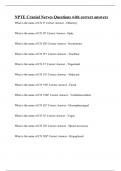
NPTE Cranial Nerves Questions with correct answers
What is the name of CN I? Correct Answer - Olfactory What is the name of CN II? Correct Answer - Optic What is the name of CN III? Correct Answer - Oculomotor What is the name of CN IV? Correct Answer - Trochlear What is the name of CN V? Correct Answer - Trigeminal What is the name of CN VI? Correct Answer - Abducent What is the name of CN VII? Correct Answer - Facial What is the name of CN VIII? Correct Answer - Vestibulocochlear What is the name of CN IX? Correct Answe...
- Exam (elaborations)
- • 10 pages •
What is the name of CN I? Correct Answer - Olfactory What is the name of CN II? Correct Answer - Optic What is the name of CN III? Correct Answer - Oculomotor What is the name of CN IV? Correct Answer - Trochlear What is the name of CN V? Correct Answer - Trigeminal What is the name of CN VI? Correct Answer - Abducent What is the name of CN VII? Correct Answer - Facial What is the name of CN VIII? Correct Answer - Vestibulocochlear What is the name of CN IX? Correct Answe...
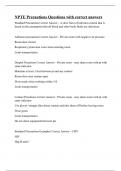
Anterior cord syndrome Correct Answer - Complete loss of: motor (lateral corticospinal) - bilateral loss of motor fun, spastic paralysis below level of lesion Pain and temperature (spinothalamic) - Bilateral loss of of pain and Temp below injury. (Pro
Standard Precautions Correct Answer - A strict form of infection control that is based on the assumption that all blood and other body fluids are infectious. Airborne precautions Correct Answer - Private room with negative air pressure Room door closed Respiratory protection worn when entering room Limit transportation Droplet Precations Correct Answer - Private room - may share room with pt with same infection Maintain at least 3 feet between pt and any contact Room door may remain o...
- Exam (elaborations)
- • 6 pages •
Standard Precautions Correct Answer - A strict form of infection control that is based on the assumption that all blood and other body fluids are infectious. Airborne precautions Correct Answer - Private room with negative air pressure Room door closed Respiratory protection worn when entering room Limit transportation Droplet Precations Correct Answer - Private room - may share room with pt with same infection Maintain at least 3 feet between pt and any contact Room door may remain o...
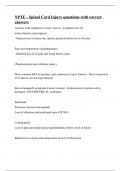
NPTE - Spinal Cord Injury questions with correct answers
Anterior cord syndrome Correct Answer - Complete loss of: motor (lateral corticospinal) - bilateral loss of motor fun, spastic paralysis below level of lesion Pain and temperature (spinothalamic) - Bilateral loss of of pain and Temp below injury. (Proprioception and vibration intact.) Most common MOI of anterior cord syndrome Correct Answer - Most common at C5-6 due to cervical hyperflexion Brown-Sequard's syndrome Correct Answer - Hemisection of spinal cord is damaged. ASYMMET...
- Exam (elaborations)
- • 19 pages •
Anterior cord syndrome Correct Answer - Complete loss of: motor (lateral corticospinal) - bilateral loss of motor fun, spastic paralysis below level of lesion Pain and temperature (spinothalamic) - Bilateral loss of of pain and Temp below injury. (Proprioception and vibration intact.) Most common MOI of anterior cord syndrome Correct Answer - Most common at C5-6 due to cervical hyperflexion Brown-Sequard's syndrome Correct Answer - Hemisection of spinal cord is damaged. ASYMMET...

6005 Mental Health ATI Questions with correct answers